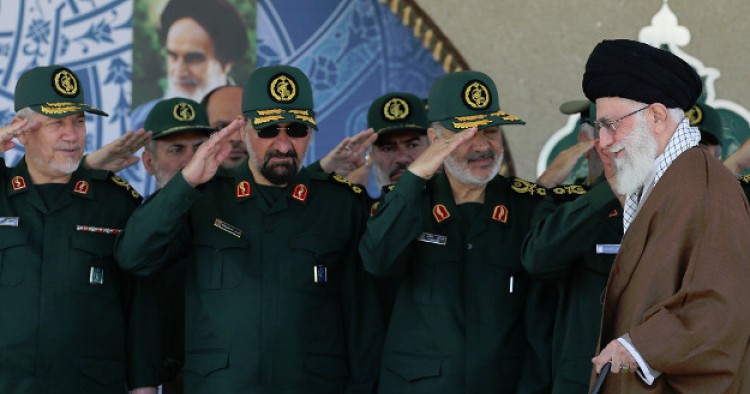As the battle against ISIS is winding down in Iraq and Syria, some military leaders and hardliners in Iran call for not only keeping a long-term military presence in both countries but also expand the country’s “military advisory missions” to other conflict zones in the region, including Yemen and Palestine, warns reformist Iranian daily Bahar. According to the article, entitled “Confusion in Syria,” Russia is drawing down its troops in Syria and is trying to focus more on a political settlement in Syria to sustain its gains. But Iran’s political and military leaders appear to be “confused” about what to do next in Syria and the broader region, it added. “What can be inferred from the military leaders’ statements is that they are inclined to continue the military presence in Iraq and Syria, and even further expand this battlefield. Potential military advisory assistance to Yemen and also Palestinian groups are among issues that have strengthened this view in recent days,” the article pointed out. It further noted that some people in the country’s decision-making establishment now argue that Iran can replicate its success in Iraq and Syria in other conflict-ridden countries by extending the “model” of anti-ISIS military mission to “resolve all current crises in the region, from Yemen to Palestine, in this way.”
The reformist paper, however, cautioned that Iran’s military presence in Iraq, in particular, is unsustainable because the fight against ISIS is over and some Iraqi politicians are already criticizing Iran’s military role in the country. The article also called on the Iranian government to take into account the human and financial cost of military adventures in the region.
Comment: As the article in the Bahar daily indicates, some military strategists in Tehran are emboldened by the latest success of the Islamic Revolution Guards Corps (I.R.G.C.) and its proxies in Iraq and Syria and may be seeking to play a more aggressive role in other regional conflicts. Last month, I.R.G.C. Chief Commander Major General Ali Jafari admitted that Iran is providing assistance to the Houthi “resistance movement” fighting the Saudi-led coalition in Yemen. “Our assistance to the resistance front has been provided at the request of their people and governments, and Yemen is one of those examples. In Yemen, the power today lies in the hands of Ansarullah and Iran’s assistance is at the level of advisory and spiritual support, which Yemen needs more.” He further stressed that the Islamic Republic will spare no effort to continue supporting the Houthi movement in the future.
After President Donald Trump’s recent announcement on recognition of Jerusalem as Israel’s capital, Iranian President Hassan Rouhani and Quds Force Commander Major General Qassem Soleimani called the leadership of Hamas to call for a “new intifada” against Israel and pledged to support Hamas’ struggle against the Jewish state. Iranian-sponsored Shiite militia groups fighting in Iraq and Syria have also indicated that they would joint Hezbollah in a potential fight with Israel in the future.
Iran’s costly military engagement in Syria became a contentious issue during the country’s presidential election earlier this year. Many Iranians at universities and during campaign rallies voiced their objection to the country’s expensive adventurism in neighboring countries at the expense of domestic priorities. One video circulating on Iranian social media, for example, showed a university student strongly denouncing the Iranian regime’s acts of oppression at home as well as military involvement abroad. The student’s fiery anti-regime speech in front of an I.R.G.C. officer indicated that many Iranians have run out of patience and are risking their lives to counter the Iranian leaders’ narrative that the I.R.G.C. fights in Syria and Iraq in order to preserve Iran’s national security. An opinion survey published showed that support for the Iranian regime’s involvement in the Syrian war had declined from 90 percent in 2014 to 24 percent in late 2016.
The Middle East Institute (MEI) is an independent, non-partisan, non-for-profit, educational organization. It does not engage in advocacy and its scholars’ opinions are their own. MEI welcomes financial donations, but retains sole editorial control over its work and its publications reflect only the authors’ views. For a listing of MEI donors, please click here.













